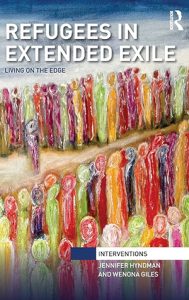Refugees in Extended Exile: Living on the Edge

Author: Jennifer Hyndman and Wenona Giles
Publisher: Routledge
Year of Publication: 2017
Print Length: 320 pages
Genre: Non-Fiction / Anthropology, Human Geography, Social Science, Migration & Refugee Studies
Topic: Lived Experience, Testimonies, Asylum & Asylum Seekers, Refugees & Forced Migration, Asylum & Refugee System, Camps, Protracted Refugee Situations, Transit, Exile & Exodus, Freedom to Move and to Stay, Movement of People and Ideas, Mobility & Immobility, Disaster, Politics & Power, Geopolitics, Governance, Global North, Global South, Humanitarian Action & Humanitarianism, Refugee Management/Governance, Security, Protection, Refugee Resettlement, Social/Aid Workers, Government Workers, Suffering, Visibility & Invisibility, History, Colonialism & Post-Colonialism, Cold War & Post-Cold War, War on Terror
This book argues that the international refugee regime and its ‘temporary’ humanitarian interventions have failed. Most refugees across the global live in ‘protracted’ conditions that extend from years to decades, without legal status that allows them to work and establish a home. It is contended that they become largely invisible to people based in the global North, and cease to remain fully human subjects with access to their political lives. Shifting the conversation away from the salient discourse of ‘solutions’ and technical fixes within state-centric international relations, the authors recover the subjectivity lost for those stuck in extended exile.
The book first argues that humanitarian assistance to refugees remains vital to people’s survival, even after the emergency phase is over. It then connects asylum politics in the global North with the intransigence of extended exile in the global South. By placing the urgent crises of protracted exile within a broader constellation of power relations, both historical and geographical, the authors present research and empirical findings gleaned from refugees in Iran, Kenya and Canada and from humanitarian and government workers. Each chapter reveals patterns of power circulating through the ‘colonial present’, Cold War legacies, and the global ‘war on terror”.
Seeking to render legible the more quotidian struggles and livelihoods of people who find themselves defined as refugees, this book will be of great interest to international humanitarian agencies, as well as migration and refugee researchers, including scholars in refugee studies and human displacement, human security, globalization, immigration, and human rights.
Table of Contents
List of illustrations
List of contributors
Preface
Acknowledgements
1. Introduction: Invisible Lives and Silent Disasters
2. Securitization versus Protection in a Refugee Camp
3. Contextualizing Indefinite Exile
4. States of Emergency?: Managing Refugees in Theory and Practice
5. “It’s so cold here; we feel this coldness”: Refugee Resettlement After Long-Term Exile
6. Conclusion
Bibliography
Index

Jennifer Hyndman is a Geography Professor and currently serves as Associate Vice-President of Research, University of York. She is also Past Director of the Centre for Refugee Studies at York. Hyndman’s research focuses on 1) conflict, human displacement, and the geopolitics of humanitarian response and refugee protection; and 2) refugee settlement, participation and social inclusion in Canada. Current research projects probe a) how private refugee sponsorship is sustained over time in Canadian communities; 2) the motivations of sponsors and the meanings they attach to the work they do (is private voluntary sponsorship particularly Canadian?), with A. Macklin (P.I.) and other co-investigators; and 3) the social determinants of well-being and integration of Syrians who came after November 2015, with M. Hynie (P.I.) and others in BC, Ontario and Quebec. She is author of Dual Disasters: Humanitarian Aid after the 2004 Tsunami (2011), Managing Displacement: Refugees and the Politics of Humanitarianism (University of Minnesota Press, 2000), and co-editor with Wenona Giles of, Sites of Violence: Gender and Conflict Zones (University of California Press, 2004). Before taking an academic path, Hyndman worked briefly for the NGO CARE in Kenya and UNHCR in Somalia where she developed an intense affinity for the politics of displacement.
Source: https://jhyndman.info.yorku.ca/ & https://www.routledge.com/Refugees-in-Extended-Exile-Living-on-the-Edge/Hyndman-Giles/p/book/9781138348790
More from Jennifer Hyndman in this library, click here.

Wenona Giles is retired from teaching, but still doing research and writing at the University of York in October 2018. She is Professor Emerita at the Faculty of Liberal Arts and Professional Studies, University of York, a Fellow of the Royal Society of Canada (FRSC), Anthropology and Faculty Research Associate at the Centre for Refugee Studies. She has published in the areas of gender, migration, forced migration, refugee issues, protracted refugee situations, ethnicity, nationalism, work, globalization, war and education. Her books include Immigration and Nationalism: Two Generations of Portuguese Women in Toronto (University of Toronto Press 2002), co-edited publications: Development and Diaspora: Gender and the Refugee Experience (Artemis, 1996); a two-volume issue of Refuge on Gender Relations and Refugee Issues (1995), and a co-edited issue of Refuge on Higher Education for Refugees (2010-11); co-edited books, Feminists under Fire: Exchanges across War Zones (Between the Lines Press, Toronto 2003), Sites of Violence: Gender and Conflict Zones (with Jennifer Hyndman and published at University of California Press, 2004) and When Care Work Goes Global: Locating the Social Relations of Domestic Work (with Mary Romero and Valerie Preston, Ashgate 2014). She is currently working on a novel.
Source: https://profiles.laps.yorku.ca/profiles/wgiles/ – https://wgiles.info.yorku.ca/ – https://www.routledge.com/Refugees-in-Extended-Exile-Living-on-the-Edge/Hyndman-Giles/p/book/9781138348790
More from Wenona Giles in this library, click here.
